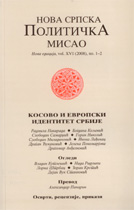| NSPM in English | |||
A system to enforce imperial power will only be resisted |
 |
 |
 |
| четвртак, 28. фебруар 2008. | |
|
It might have been expected that the catastrophe of Iraq and the bloody failure of Afghanistan would have at least dampened the enthusiasm among western politicians for invading other people's countries in the name of democracy and human rights. But the signs are instead of a determined drive to rehabilitate the idea of liberal interventionism so comprehensively discredited in the killing fields of Fallujah and Samarra . First there was the appointment of the committed interventionist Bernard Kouchner as French foreign minister. Then, late last year, the supposedly reluctant warrior Gordon Brown used the lord mayor's banquet to reassert the west's right to intervene across state borders. This month the foreign secretary David Miliband argued that "mistakes" in Iraq and Afghanistan should not weaken the moral impulse to intervene around the world in support of democracy, "economic freedoms" and humanitarianism, whether peacefully or by force. Meanwhile in the US , both contenders for the Democratic party nomination have signed up longstanding liberal interventionists as foreign policy advisers: the academic Samantha Power in the case of Barack Obama; and the 1990s administration veterans Richard Holbrooke and Madeleine Albright in Hillary Clinton's. The interventionists, it seems, are back in business. And now Kosovo's declaration of independence has given them a banner to rally the disillusioned to a cause that gripped the imagination of many western liberals in the 90s. John Williams, the foreign office spin doctor who drafted the infamous Iraq war dossier in 2002, wrote last week that the Kosovo war had convinced him to follow Tony Blair over Iraq - and it would be a "tragedy" if Iraq made future Kosovos impossible. The Independent on Sunday went further, calling Kosovo's new status a "triumph of liberal interventionism". But it's hard to see much triumph in the grim saga of Kosovo. Nato's 1999 bombing campaign, unleashed without UN support and widely regarded as a violation of international law, was supposed to halt repression and ethnic cleansing, but triggered a massive increase in both; secured a Serbian withdrawal only through Russian pressure; and led to mass reverse ethnic cleansing of Serbs and Roma, including almost the entire Serb population of Pristina. After nine years of Nato occupation under a nominal UN administration, crime-ridden Kosovo is more ethnically divided than ever, boasts 50% unemployment and hosts a US military base described by the EU's human rights envoy as a "smaller version of Guantánamo". Its independence - declared in defiance of the UN security council and damned by Russia , China and EU states such as Spain as illegal - is a fraud and will remain so as an EU protectorate controlled by Nato troops. By encouraging a unilateral breakaway from Serbia , without negotiation and outside the UN framework, the US , Britain and France have given the green light to secessionist movements from Abkhazia to Kurdistan . The claim that Kosovo sets no precedent because it suffered under Serbian rule is absurd. Haven't the Kurds or Chechens suffered? The difference boils down to power and who is supporting whom, not justice. Of course the Kosovans have the right to self-determination, but they certainly won't get it as a Nato colony, nor at the expense of other nationalities in the Balkans, where the impact of Kosovo's declaration on Bosnia and Macedonia could be conflagrationary. The significance of the breakaway has meanwhile not been lost on the Muslim world, which has long been urged to see American support for Muslim Kosovo and Bosnia as proof of US good intentions, but has been notably slow to recognise the breakaway province. As Yasser az-Za'atra wrote in the Jordanian daily al-Dustour this week: "Besieging Russia is the main reason that led Bush to support Kosovo's independence. The rise of Russia and China provides a balance to the US and is undoubtedly in the Muslims' interest. It is not in the Muslims' interest to secede - not in Kosovo, nor in Chechnya , nor even in China ." Far from helping to rehabilitate liberal interventionism, the Kosovo experience highlights the fatal flaws at its heart. By supporting one side in a civil war, bypassing the UN and acting as judge and jury in their own case, the western powers exacerbated the humanitarian crisis, bequeathed a legacy of impoverished occupation and failed to resolve the underlying conflict. They also laid the ground for the lawless devastation of Iraq : the bitter fruit of the Kosovo war. At the height of the 1999 Nato bombing campaign, Blair set out five tests for intervention as part of his "doctrine of international community", a catechism for liberal interventionists much admired by the Washington neoconservatives who followed them. Arguably, only one of the five was met in Iraq . What's more, both the US and Britain not only committed military aggression on the basis of falsehoods, they have been responsible for hundreds of thousands of deaths and millions of refugees in Iraq and Afghanistan : a humanitarian crisis that dwarfs anything that happened in the former Yugoslavia in the 1990s. Between them, they have also been responsible for torture, kidnapping and mass detentions without trial. The latest allegations of beatings, killings and mutilations of Iraqi prisoners by British soldiers at Camp Abu Naji near Amara in 2004 are only the most extreme of a series that include the unpunished beating to death of Baha Mousa in custody in Basra . But there is of course not the slightest prospect of any humanitarian intervention against the occupiers of Iraq for the obvious reason that they are the most powerful states in the world who act in the certain knowledge that they will never be subject to any such violent sanction for their own violations of humanitarian and international law. But it is exactly that widely understood reality that undermines the chances of a genuine multilateral basis for humanitarian intervention. As the ability of the US to dictate to the UN weakens, it's not surprising that pressure to revive unilateral liberal interventionism has grown. But any rules-based system of international relations has to apply to the powerful as well as the weak, allies as well as enemies, or it isn't a system of rules at all - it's a system of imperial power enforcement which will never be accepted. This article appeared in the Guardian on Thursday February 28 2008 on p33 of the Comment & debate section. It was last updated at 00:15 on February 28 2008. |
Од истог аутора
Остали чланци у рубрици
- Playing With Fire in Ukraine
- Kosovo as a res extra commercium and the alchemy of colonization
- The Balkans XX years after NATO aggression: the case of the Republic of Srpska – past, present and future
- Из архиве - Remarks Before the Foreign Affairs Committee of the European Parliament
- Dysfunction in the Balkans - Can the Post-Yugoslav Settlement Survive?
- Serbia’s latest would-be savior is a modernizer, a strongman - or both
- Why the Ukraine Crisis Is the West’s Fault
- The Ghosts of World War I Circle over Ukraine
- Nato's action plan in Ukraine is right out of Dr Strangelove
- Why Yanukovych Said No to Europe

.jpg)





















